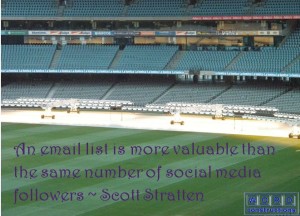I hope you find my writing and business tips and observations useful. My business and blog are dedicated to helping businesses communicate clearly and reach their potential.
Read, subscribe to my newsletter, enjoy!Tash
The rewards of hiring a business writer
Occasionally I am asked what return on investment (ROI) people can expect from hiring a professional writer. And now I have your curiosity peaked, too, I can’t give you a straight answer – sorry!
 I can’t give a dollar figure (or even a percentage) as there are too many variables to factor in – the type of business you run, what aspects you get professionally written (eg just an about us page or your entire website), your profit margins and how you utilise the words the writer scribes for you.
I can’t give a dollar figure (or even a percentage) as there are too many variables to factor in – the type of business you run, what aspects you get professionally written (eg just an about us page or your entire website), your profit margins and how you utilise the words the writer scribes for you.
However, I can give you some ideas to assess how a writer can reward you and your business so you can decide on your own ROI…
- at the worst, you gain time for selling and servicing customers. So if you hire me to do two hours writing for you, that’s two hours extra in your working week – in fact, if you don’t write as fast as me, you’ve saved more than two hours which you hopefully spend on making money!
- for online content, remember that content is king. Fresh, quality content will result in more links and traffic which ultimately increases your chances of making sales
- sending out a clear message and ensuring that your website answers all key questions competently will save you phone call and emails asking basic questions. In reality, that saves you frustration, time and the time it takes to get back on task after such interruptions
- polished and professional content will build your image and reputation as much as your message does, and possibly more so. A stronger reputation builds your credibility which will have a long-term positive impact on your sales
- a proposal that flows, is spelt correctly, etc is more likely to win you work
- a well written website will have a higher conversion rate (ie will turn more visitors into buyers) than a site that is hard to understand or uses poor grammar and spelling – remember that doubling your conversion rate will double your turnover…
Have you experienced a good ROI from hiring a business writer?
Let me finish with a quote from Brad Sugars, entrepreneur and multi-millionaire, author and investor:
Communication is the lifeblood of business, and when it comes to sales, it’s vital. It has a direct relationship with sales. You see, the better you are at communicating, the better your sales results will be. You can almost measure the one with the other… Let me put it another way. True communication is the response you get. So if you’re not getting the response you want, you’re not communicating properly.
tracking advertising
A few days ago, I was reminded of the importance of tracking advertising through a story a friend told me.
The story: a company spent $60,000 or so on an advertising campaign, but didn’t implement any means of tracking the results of the ad. Meaning they have spent $60,000 and have no idea if it raised their brand awareness or brought in customers and revenue (I’m not sure which was the aim of their campaign.) So when the radio stations come back and ask if the company wants to repeat the ad, who knows if they should say yes or no…
The moral: tracking advertising is important for a number of reasons:
- makes it easy to decide on a repeat of the campaign
- helps you better understand your demographic (e.g. they may listen to the radio but not respond to the type of ad you ran)
- assess the ROI (return on investment) and value of the campaign – $60,000 is nothing if it results in $500,000 of sales, but it is a ridiculous amount of money if it results in $100 profit
- tracking and comparing different ads allows you to decide the most effective advertising for your business (e.g. radio vs TV vs major newspapers vs local advertising) PLUS you can tweak the actual ad to find the best presentation, too
Even if your budget is nowhere near $60,000, tracking of advertising is a worthwhile exercise.
Don’t assume that free ads aren’t worth tracking, either. Why?
- the results from a free ad can be a useful comparison with paid advertising
- free ads can be a great place to test different wording and formats for your ad before you pay for its placement (assuming a very similar audience of course)
- if the ad is free in monetary terms but costs a lot of time, tracking will help you determine if you are getting enough reward for your time
- a free ad may be attracting the wrong people – people who don’t become customers and use up your valuable time. If you know many false leads are coming from a certain ad, stop that ad even if it is free!
Have you used tracking with your advertising? Did you find it a useful activity, even if tedious and time consuming?
P.S. You can read more about the basics of tracking your advertising or assessing the results of tracking in my articles.


Recent Comments